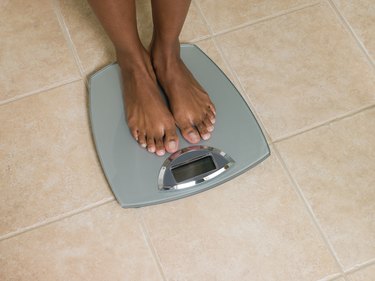
Your best friend seems to eat everything in sight but never gain a pound, while you look at a slice of cake and start packing on pounds. It may be the luck of the genetic draw, but diet and lifestyle factors also help determine how you manage your weight. If the number on the scale keeps rising no matter what you do, however, talk to your doctor; you may have an underlying medical condition that is fueling your weight gain.
Genetics and Weight Gain
Video of the Day
Just as genes affect your height and eye color, your specific genetic makeup helps determine your body weight and how quickly you gain or lose pounds. Researchers studying the human genome have isolated genes that influence fat distribution and development, body mass index and appetite, reports the National Institutes of Health.
Video of the Day
In one study of more than 5,000 people over 10 years, scientists, according to results published in the journal Genes and Nutrition in 2014, found a specific gene mutation related to fatty tissue occurs in about one-third of all women. This particular gene, called MMP2, can lead to fat accumulation and weight gain in women who have it. The same study discovered that 87 percent of all men with another mutant gene, called FTO, were at higher risk for weight gain.
Diet and Weight Gain
Genes don't hold the whole story of why you gain weight faster than the next person, though. While men with the FTO gene have a propensity to eat more calories and gravitate toward fatty, sugary fare, no one is forcing them to eat junk. Dietary choices affect weight gain, too. A single behavior – drinking two 16-ounce colas a day, each of which weighs in at 207 calories – could add a pound to your weight in a little over a week if the calories exceed your dietary needs.
Avoid "empty" calories from sugary foods and beverages – those with little to no nutritional value – and opt instead for low-calorie, nutrient-dense foods like fruits, vegetables, lean protein and whole grains. You'll be able to eat more of these foods and feel satisfied without exceeding your calorie needs.
In addition, people who diet, quit and then repeat the cycle are likely to put on more weight than those who don't diet at all. Restrictive fad diets may lead to binge eating when you return to your "normal" eating patterns. Instead of dieting again and again, follow a consistent regimen full of nutrient-dense foods to avoid weight gain.
Effect of Exercise on Weight
If you've gained more weight than your neighbor, she may have a more rigorous routine of physical exercise. A total of about 150 minutes a week of moderate-intensity exercise is the standard recommendation for adults, plus 75 minutes a week of strength training; but some people require as much as 300 minutes a week of aerobic activity to prevent weight gain. After menopause, for example, women have more success trimming their waistlines with the higher recommendation, according to a study published in JAMA Oncology in 2015.
If you exercise but the scale goes up, not down, you may be adding excess calories after your workout without realizing it, in the form of recovery snacks or big meals you feel you've "earned." One protein bar could equal 220 calories, says the Academy of Nutrition and Dietetics, while a cup of trail mix might have as many as 700 calories.
Other Factors in Weight Gain
When you undergo chronic stress or get insufficient sleep, you may gain weight more easily than other people. Stress affects food choices by driving up the desire for unhealthy "comfort foods" like fatty, sugary choices. It may also lead to insomnia, which disturbs the normal function of the hormones leptin and ghrelin, which signal your body when to eat and when to stop. Techniques like yoga, deep breathing, listening to music or reading can help keep your stress levels – and hence your weight – more manageable.
- NIH: Genetic Studies Yield New Insights Into Obesity
- Genes and Nutrition: Gender-specific Genetic Associations of Polymorphisms in ACE, AKR1C2, FTO and MMP2 with Weight Gain Over a 10-year Period
- Medical Daily: Gene Mutation in Women Can Cause Weight Gain
- USDA Nutrient Database: Beverages, Carbonated, Cola, Regular
- Forks Over Knives: Calorie Density Approach to Nutrition and Weight Management
- Intuitive Eating: Warning: Dieting Increases Your Risk of Gaining More Weight
- Human Kinetics: Understanding the Current Physical Activity Guidelines for Adults
- JAMA Oncology: Effects of a High vs. Moderate Volume of Aerobic Exercise on Adiposity Outcomes in Postmenopausal Women
- Academy of Nutrition and Dietetics: 3 Basic Tips to Avoid Weight Gain with a New Exercise Regimen
- Psychology Today: Why We Gain Weight When We’re Stressed